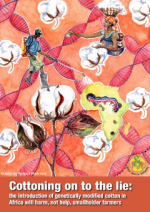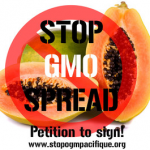15.06.2015 | permalink
France has announced a ban on over the counter sales of weedkiller Roundup
Roundup weedkiller banned from French garden centres over 'probable' link to cancer
The French Ecology Minister said: 'France must be on the offensive with regards to the banning of pesticides'
Monday 15 June 2015
France has announced a ban on over the counter sales of a brand of weedkiller from garden centres after the active ingredient was classified as "probably carcinogenic to humans" by the UN.
The UN’s International Agency for Research on Cancer (IARC) classified glyphosate in March as "probably carcinogenic to humans", and is the active ingredient in Roundup.
The weedkiller is used by amateur gardeners as well as farmers and is the foremost product of American biotechnology giant Mosanto.
French Ecology Minister Segolene Royal told France 3 television on Sunday: "France must be on the offensive with regards to the banning of pesticides."
- The Independent: Roundup weedkiller banned from French garden centres over 'probable' link to cancer
- Reuters: French minister asks shops to stop selling Monsanto Roundup weedkiller
- IBT Media Inc: Segolene Royal Calls For French Ban On Monsanto's Roundup Herbicide
- Consumer Association CLCV: Glyphosate: a "probable carcinogen" herbicide
12.06.2015 | permalink
Cottoning onto the lie: GM cotton will harm not help small farmers in Africa

After 5 seasons of genetically modified (GM) cotton cultivation in Burkina Faso farmers are denouncing their contracts with Monsanto and cotton stakeholders are discussing compensation for losses incurred since 2008 due to low yields and low quality fibre. Many other African governments are poised to follow suit but should note how GM cotton has impoverished smallholders in South Africa and Burkina Faso as well as heed the fierce opposition on the continent toward accepting it.
- African Centre for Biodiversity: Cottoning onto the lie: GM cotton will harm not help small farmers in Africa
- African Centre for Biodiversity: Cottoning on to the lie: The introduction of genetically modified cotton in Africa will harm, not help, smallholder farmers
- GMO-FREE EUROPE: African agriculture under threat: GM crops in the wider context
09.06.2015 | permalink
Africa's farmers fight the corporate takeover of seeds, land and food
Lured by promises of aid and investment, African governments are rewriting laws to create lucrative opportunities for corporate agribusiness, writes Chris Walker - while consigning their own farmers to servitude and landlessness. But now farmers are rising up, as in Ghana where a new 'Monsanto law' threatens to end their right to grow, save and share their ancestral seeds.
"We, the small holder farmers, want to have good lives," says Victoria Adongo from the Peasant Farmers' Association of Ghana. "We have our seed systems that we like and are proud of. So we do not want multinational companies to come in and take over."
Not only can agroecology increase Africa's farming yields, unlike corporate-led farming, it can help farmers control their land, seeds and livelihoods, and build resilient local economies.
Adongo, speaking in Global Justice Now's new short film Whoever Controls Seeds, Controls the Food System (https://youtu.be/pWKfg0d63SA) - launched this week - is explaining what could be at stake if Ghana's parliament passes new seed laws backed by G8 governments.
08.06.2015 | permalink
Commissioner Andriukaitis´ speech on GMO at the extraordinary meeting of the ENVI Committee
SPEECH - 8 June 2015
Commissioner Andriukaitis addressing extraordinary meeting of the parliament's committee on the environment, public health and food safety on GMO Proposal
Chairman, Honourable Members,
Thank you for inviting me to this extraordinary meeting of the Committee on the Environment, Public Health and Food safety to discuss the Commission proposal to amend the GM food and feed Regulation.
(.....)
Therefore I would like to ask everyone to play fair here. The Commission will still be in charge as regards GM authorisations, which would continue to be granted at European level. However Member States who have identified very serious legitimate concerns about the use of GMOs will have the possibility to present these concerns and to restrict the use of GMOs on their territory.
(.....)
First of all, the Member States could not base their restrictions or bans on grounds which conflict with the element considered by EFSA during the risk assessment. They could only use “compelling grounds” unrelated to science.
"Other legitimate factors” is a notion already present in the legislation. The Commission can use these in the context of the decision of authorisation, but in practice, due to the divergent views of Member States, the Commission has never been in a position to identify legitimate factors valid at EU-level which could justify refusing an authorisation.
The proposal seeks to allow Member States to use these "compelling grounds", based on their own national situation. This is in line with the subsidiarity approach.
Let me also stress that the use of compelling grounds by the Member States is compatible with the single market rules. Indeed, the Treaty foresees the possibility to derogate to the Single Market for “overriding reasons of public interest”.
The movement of GM food and feed would be preserved. Member States could not ban the free circulation and import – only the use. Member States would not be allowed to ban food and feed where GMOs are present at trace level.
Other Member States and the Commission would have the possibility to comment on the draft opt out measures.
(.....)
04.06.2015 | permalink
Force-Feeding Risky GM Staple Food to South Africans

Are Food Producers Abandoning GMOs in Breakfast Cereals but Force-Feeding Risky GM Staple Food to South Africans?
PRESS RELEASE FROM THE AFRICAN CENTRE FOR BIODIVERSITY (ACB) Johannesburg, 04 June 2015
The African Centre for Biodiversity (ACB) has re-tested 4 popular maize milled products as well as 16 baby and breakfast cereals containing maize and/or soya ingredients in order to gauge the extent to which food producers are responding to consumer pressure (see Tables 1 and 2 below). The latest results reveal that the four food companies that control our maize milled market—Premier, Tiger Brands, Foodcorp and Pioneer—remain intransigent and are determined to force feed South African consumers with risky GM maize. The re-test results show an overall increase in the percentage of GM maize in the popular maize brands.1 The average amount of GM maize in a packet of maize meal is now 80%.
03.06.2015 | permalink
Top Supermarkets in Switzerland Remove Glyophosate From Shelves
Major Blow to Monsanto’s Glyphosate as Swiss Retailers Begin Removing Herbicides From Store Shelves
Why are the Swiss willing to protect their people over the risk of profits and from cancer but not US retailers?
Coop supermarkets and Coop Building & Hobby hardware stores in Switzerland are effective immediately removing all glyphosate-containing herbicides including Round Up from it’s shelves. Following in their footsteps Migros another major retailer has also stated they will be doing the same. No word yet if retailers Landi, Hornback and Jumbo would also remove all glyphosate from their stores. The push for a permanent ban in the Swiss nation is being made by via a petition.
The petition (link below) has been launched demanding that glyphosate be banned permanently in Switzerland. The petition demands “Glyphosate ban – now!
The petition can be signed here: https://www.konsumentenschutz.ch/themen/lebensmittelproduktion/glyphosat-verbieten-jetzt/
or here:
http://www.greenpeace.org/switzerland/de/Kampagnen/Glyphosat/
02.06.2015 | permalink
PETITION: STOP GM PAPAYA CONTAMINATION

For a moratorium on importated papaya seeds to New Caledonia
In February of 2014, the New Caledonian Government passed an order to ban the importation of GM fruit seeds, including papaya, into the territory. The ban was put into place in August of 2014. Nevertheless, this new law went nearly unnoticed: no debate on this serious issue…are there GM papaya plants in New Caledonia?
In spite of repeated demands, the institutions of New Caledonia have continued to turn a political blind eye regarding the presence of possible GM papaya plants in the territory and the probable contamination to the traditional local papayas. For several years now, the Office of Agriculture Development of the Southern Province have recommended using papaya seeds from the Hawaiian SunUp variety, the infamous GM papaya developed by the University of Hawaii.
The importation of seeds, and the contamination of local papaya plants is of no doubt, now is the time to inform the population in order to take the necessary steps to stop it. Moreover, given the risks of contamination and the spreading of GM papaya everywhere, it is no longer reasonable to continue to import papaya seeds into New Caledonia at all, even if they are not considered GMO.
29.05.2015 | permalink
Videos from GMO-FREE EUROPE Conference 2015
Now you can enjoy watching the videos from this year´s GMO-FREE EUROPE Conference.
http://www.gmo-free-regions.org/gmo-free-europe-2015/videos-from-gmo-free-europe-conference.html
GMO-FREE EUROPE Conference Berlin May 6, 2015 (Time 1:24:43)
GMO-FREE EUROPE Conference Berlin May 7, 2015 pt1 (Time 1:17:04)
GMO-FREE EUROPE Conference Berlin May 7, 2015 pt2 (Time 1:32:21)
GMO-FREE EUROPE Conference Berlin May 8, 2015 (Time 2:15:52)
GMO-FREE EUROPE Conference Berlin May 6 to 8, 2015: Interviews (Time 27:05)
27.05.2015 | permalink
EU Parliament draft report on organic regulation, going in the right direction

Brussels, 26 May 2015 – Today the European Parliament’s rapporteur on the Commission’s proposal for a new EU organic regulation, Martin Häusling, has presented his report to the Parliament Agriculture Committee.
“We welcome Martin Häusling’s report, which better reflects the needs of the organic sector, and is in line with the opinion of the Committee of the Regions and the independent evaluation report subcontracted by the Commission in 2012. It is a major step in the right direction, focusing on the needed improvements in the current legislation and clearly showing an understanding that an evolution of the organic regulation is needed, not a revolution”, said IFOAM EU President Christopher Stopes.
“One of the main issues hampering the organic sector is uneven implementation by Member States and the Green’s report adds new elements to the discussion,” stated Marco Schlüter, IFOAM EU Director. “The report also removes the most problematic elements of the Commission’s proposal, including the wrong-headed decertification threshold which would make organic farmers and processors pay for the pollution caused by adventitious contamination. In restoring the control aspects to the organic regulation, MEP Häusling also maintains the understanding that the organic food and farming based on a principled process of production, which cannot be evaluated simply by testing a final product. Import is another area where progress has been made, as the Green MEP corrects the Commission’s flawed compliance-based approach which would be detrimental to developing countries and would affect the availability of products for EU processors and consumers. Overall Häusling’s report is a good basis for discussion, even though some aspects need to be fine-tuned”.
22.05.2015 | permalink
Laws regulating seeds in South Africa to entrench hunger and inequality

Press Release from the Food Sovereignty Campaign
On 15 May South Africa’s Portfolio Committee on Agriculture held public hearings on two Bills that protect and regulate the commercial seed industry; the Plant Breeders Rights (PBR) Bill and the Plant Improvement Bill. The PBR Bill aims to stimulate innovation in plant breeding by awarding extremely strong intellectual property rights to breeders and the Plant Improvement Bill allows only certified seed to be sold on the commercial market. Several NGOs and smallholder farmers made submissions to the committee, saying that the laws will entrench inequality and deepen the hunger crisis in the country because the Bills are oblivious to seed systems that support smallholder farmers and ecological forms of farming. These laws do not recognise or protect farmer-managed seed systems or agricultural biodiversity but undermine the rights of farmers, including their right to re-use, exchange and sell farm-saved seeds.
South Africa is one of the few African countries that is Party to the 1978 International Union for Protection of Plant Varieties (UPOV) - an intergovernmental organization that was established to reward breeders for their new plant varieties by granting intellectual property rights (IPRs) on the basis of a set of clearly defined principles. This has resulted in highly industrialised seed sectors where commercial breeders have strong protection, while farmers are restricted from sharing or selling seed that is protected under this regime. The South African PBR Bill (like its current Act), is based on UPOV 1991 and not UPOV 1978. UPOV 1991 has been slammed world-wide for giving private breeders excessive protection; criticisms include that UPOV 1991 protects private breeders IPRs but does not protect farmers’ varieties from misappropriation; that it promotes genetically uniform seed suited to industrial chemical-dependent agricultural systems that are environmentally harmful, that it does not exempt crops that are important for food security from exclusive property rights and critically, that it outlaws the age-old practice of exchanging seed which has resulted in the agricultural diversity that we know today. Seed exchange also provides safety nets amongst communities for food sovereignty. The second Bill, the Plant Improvement Bill, could also outlaw the sale or exchange of seed that does not meet stringent and higly industralised certification standards set out in the Bill, and these standards apply to commercial seed, not farmers’ varieties or seed appropriate for ecological agriculture. This creates a deeply troubling and inequitable situation where only certified corporate seed is allowed on the market.



